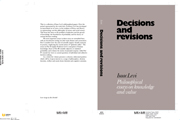Book contents
- Frontmatter
- Contents
- Preface
- PART I Cognitive decision making
- 1 Must the scientist make value judgements?
- 2 On the seriousness of mistakes
- 3 Corroboration and rules of acceptance
- 4 Deductive cogency in inductive inference
- 5 Information and inference
- 6 Epistemic utility and the evaluation of experiments
- 7 Abduction and demands for information
- PART II Knowledge and ignorance
- PART III Chance and surprise
- PART IV Decision making
- Bibliography of Isaac Levi
- Bibliography
- Index of names
- Index of subjects
4 - Deductive cogency in inductive inference
Published online by Cambridge University Press: 26 March 2010
- Frontmatter
- Contents
- Preface
- PART I Cognitive decision making
- 1 Must the scientist make value judgements?
- 2 On the seriousness of mistakes
- 3 Corroboration and rules of acceptance
- 4 Deductive cogency in inductive inference
- 5 Information and inference
- 6 Epistemic utility and the evaluation of experiments
- 7 Abduction and demands for information
- PART II Knowledge and ignorance
- PART III Chance and surprise
- PART IV Decision making
- Bibliography of Isaac Levi
- Bibliography
- Index of names
- Index of subjects
Summary
Introduction
Keith Lehrer and R. C. Sleigh (1964) have considered some difficulties lurking in principles laid down by Roderick Chisholm in his book Perceiving. The problem raised by Lehrer and Sleigh is not, however, of parochial interest to students of Chisholmian epistemology. The most detailed attempt to come to grips with the problem in recent years is found in Henry Kyburg (1961). In any event, the question is one which must be faced by anyone who takes seriously the idea that at least sometimes investigators have evidence that warrants their accepting sentences as true even though these sentences are not deductive consequences of the evidence.
In Lehrer's presentation, the difficulty arises from two of Chisholm's principles:
P1. S has adequate evidence for h if and only if h is more probable than not on the total evidence of S.
P2. If S has adequate evidence for i and S has adequate evidence forj, then S has adequate evidence for i & j.
If the multiplication rule for conjunction is legislative for probabilities as used in P1, then the probability that i & j will, as a rule, be less than the probability that i and the probability that j. Hence, there will be cases where the probability that i will be greater than the probability that ∼i and the probability that j greater than the probability that ∼j but the probability that i &j less than the probability that ∼(i & j)–i.e., ∼i v ∼j.
Information
- Type
- Chapter
- Information
- Decisions and RevisionsPhilosophical Essays on Knowledge and Value, pp. 42 - 50Publisher: Cambridge University PressPrint publication year: 1984
